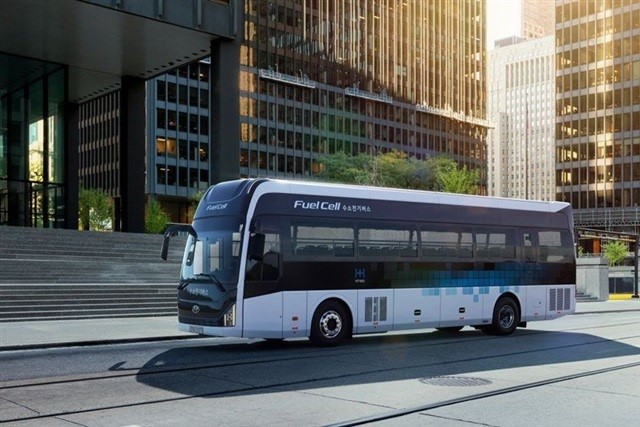In the context of the global push for carbon neutrality, Hyundai Motor is actively responding and is committed to reshaping the Korea eco-friendly bus market by investing heavily in the hydrogen-powered bus business. This strategic move not only demonstrates Hyundai's commitment to environmentally friendly technologies, but also demonstrates its ambitions in the field of new energy.
Hyundai Motor's strategic investment
Hyundai plans to make a major investment in Kohygen, which specializes in hydrogen-powered bus charging stations. According to the Korea Economic Daily, Hyundai Motor is preparing to acquire 3.5 million of Kohygen's newly issued 4 million shares for 17.5 billion won, increasing its stake from 9% to 48%.
Expansion of hydrogen-powered charging stations
Hyundai's investment will drive the construction of more than 300 charging stations nationwide in Korea. Currently, Kohygen operates only six charging stations, but faces the dual challenges of high investment costs and slow adoption of hydrogen-powered buses. The cost of building a hydrogen-powered charging station is about 3 billion won, while the construction of 300 charging stations is expected to require an investment of 900 billion won.

Pictured: Hyundai Motor is promoting hydrogen-powered buses in Korea
The market potential of hydrogen-powered buses
Despite the challenges, Hyundai Motor is expected to dominate the market as the only hydrogen fuel cell bus manufacturer in Korea. With the acquisition of Hyundai Mobis' hydrogen fuel cell business in 2024, Hyundai Motor will take control of the full range of technologies, from battery development to vehicle manufacturing, further consolidating its market leadership position.
Hydrogen technology for Hyundai Motors
Hyundai has made significant achievements in hydrogen technology. For example, Hyundai Motor Group's hydrogen fuel cell system has been successfully installed in various applications such as sanitation vehicles, logistics vehicles, and buses, and has been promoted in the Guangdong hydrogen energy demonstration city cluster. In addition, Hyundai Motor Group showcased the HTWO Grid Solution, a comprehensive solution for the entire industry chain including hydrogen transportation, storage, and application.
Hydrogen-powered buses vs. Conventional fuel vehicles
As an emerging force in the field of public transportation, hydrogen-powered buses show a series of significant advantages over traditional fuel vehicles, but also face some challenges. Hydrogen-powered buses have obvious advantages in terms of environmental performance, speed of energy replenishment, and low-temperature adaptability, but they still face challenges in terms of cost, infrastructure construction, and technological maturity. With technological advancement and industrial policy support, these challenges are expected to be gradually solved, and hydrogen-powered buses are expected to play a more important role in the field of public transportation in the future.
Advantage:
Zero emission: Hydrogen fuel buses have no mechanical loss in the energy conversion process, high energy conversion rate, and the final product is only electricity, heat and water vapor, achieving true zero emission, which is of great significance for improving the urban environment and reducing air pollution.
Rapid refueling: Hydrogen buses take about 15 to 20 minutes to refuel, which is much lower than the 3-4 hours required for electric vehicles, and have a longer range of 400 to 500 kilometers, effectively improving the operational efficiency of buses.
Good low-temperature performance: Hydrogen fuel cell systems can start quickly under extremely low temperature conditions, such as minus 30°C without auxiliary heat, which is especially important for bus operations in cold winter regions.
Challenge:
Cost problem: The initial acquisition cost of hydrogen energy buses is high, of which the cost of hydrogen fuel cells, the core component, accounts for a large proportion. In addition, hydrogen is relatively expensive to produce, store and transport.
Insufficient infrastructure: The supply network of hydrogen fuel is not perfect, and the construction speed and distribution density of hydrogen refueling stations are not enough, which limits the large-scale promotion and application of hydrogen-powered buses.
Technology maturity: While hydrogen fuel cell technology has made significant progress, it still needs to be further improved in terms of reliability, durability and cost-effectiveness to compete with conventional combustion and electric vehicles.
Summary
This strategic move by Hyundai Motor will not only promote the expansion of hydrogen-powered buses, but also accelerate the development and application of hydrogen technology. Through large-scale investment in the construction of charging stations and the research and development of hydrogen energy technology, Hyundai Motor is expected to occupy an important position in the global eco-friendly bus market and contribute to the realization of a green and sustainable future.
Through this analysis, we can see Hyundai Motor's in-depth layout and long-term planning in the field of hydrogen energy, reflecting its sense of responsibility and innovative spirit as a global leader in the automotive industry. As hydrogen technology continues to mature and the market expands, Hyundai Motor is expected to play a key role in driving the green transformation of the transportation sector.






